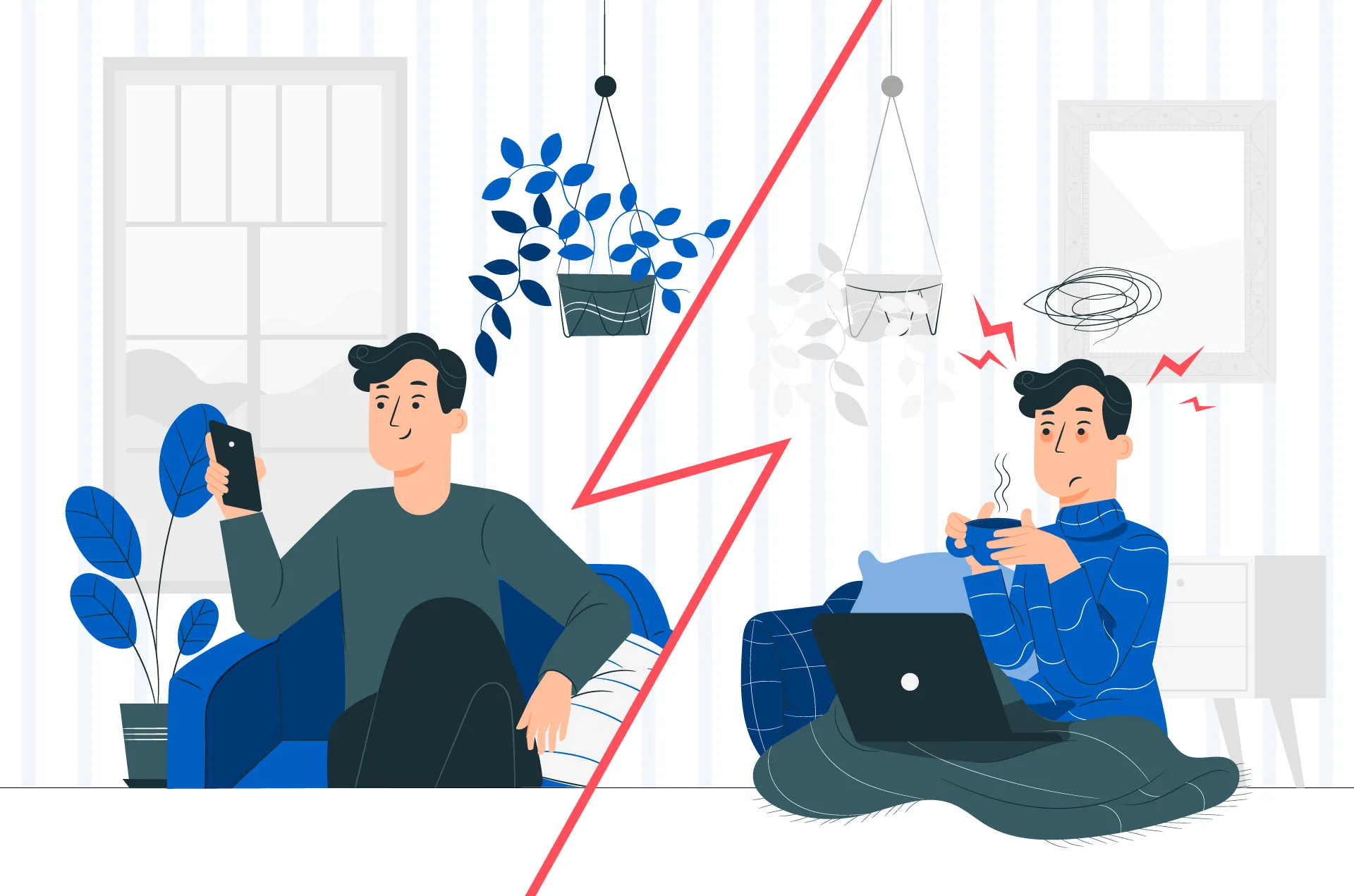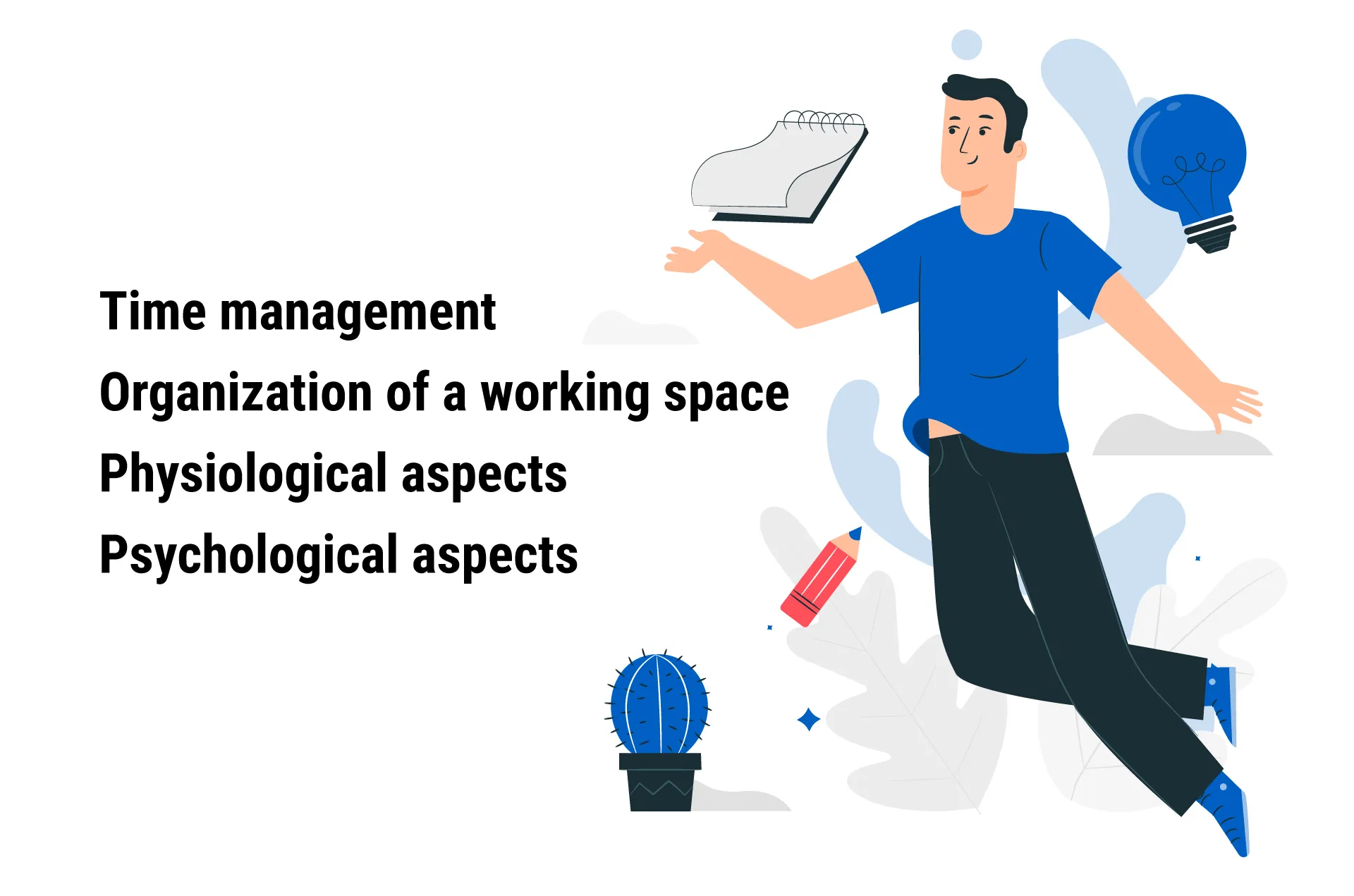Table of contents
- Work from home: what are the pitfalls?
- Work from home: good or evil?
- Tips for working from home: the key aspects to consider
- Time management in work from home
- Respect your working schedule
- Divide your working day into sprints
- Inform your households of your working hours
- Organization of working space for productive remote work
- Working from home is not working from bed
- Carve out your working zone
- Surround yourself with everything needed
- Remote work and physiology
- Exercise
- Allow yourself some breaks during the day
- Let the fresh air break into your apartments
- Psychological aspects of remote work
- Don't afraid of being addicted to routine
- Avoid multitasking
- Pat yourself on the back
- How does Emerline support employees who work from home?
- A few words to conclude
Work from home, previously merely unattainable but very desirable practice, has become an obligatory new normal in recent months. And, according to all laws of the genre, instead of being a gift, for many of us, it has turned out to be a nagging headache. What's that saying? The grass is always greener on the other side of the fence, right?
But how did it happen that the reflection of reality to a cherished fantasy of remote work has become so disappointing for many? Are work from home benefits no more than a mind playing trick or are we just blowing something wrong?
Work from home: what are the pitfalls?
How often have you imagined how great it would be to wake up in the morning a bit later than usual because you don't have to waste your time on the way to work, skip an office-dressing routine, and replace it with an outfit made of blankets and pillows, brew a pot of refreshing coffee, turn on your laptop, smoothly sink into the completion of your working tasks and spend the whole day in a laid-back yet highly productive mode? What a beautiful fantasy! And what is the realistic scenario for this pipe-dream?

The alarm beeps a few minutes before your daily video-conferencing with colleagues starts. In a desperately sleepy condition, you try to use the left minutes to brush your teeth, put the kettle on, turn on your computer, and make your face look ready for work. When the conference starts, you notice a pillow-print on your (or sometimes on your colleagues') face. The left kettle whistles, members of your household wake up, and you start begging for minutes of quietness to complete the Skype call in peace. When it finally gets finished, you run to the kitchen to prepare some kind of breakfast and calm down screaming for food cats. The rest of the day you try to balance between home and work activities, meanwhile putting a lot of effort into preventing your cats from falling asleep on your laptop. Finally, you find yourself working in the middle of the night, with the back aching from a mojibake's pose (the only one possible for working from bed), and trying to handle the shock of this new reality.
Work from home: good or evil?
While such scary scenarios can vary, there is one conclusion we can draw: there is a wide gap between an imaginable and realistic work from home routine. So does this mean that in-office work is better than its remote alternative? Does this mean that work from home is evil? For sure, it doesn't.
The truth is that there are a lot of people who benefit from the remote work process. And it's not about a certain type of personality who enjoys the work from home inconveniences. Instead, it's about your ability to establish a well-thought-out routine.
So what are the tips for productive and satisfying work from home, and are there any at all? Let's see.
Tips for working from home: the key aspects to consider
While it may seem first that the establishment of a good remote work process requires a lot of effort, the truth is that it doesn't. The only thing a person who wants or needs to work from home has to do is to take into account four main aspects that differentiate remote work processes from the in-office ones. These are:

Now, let's dive into each to see what steps a person can take to ensure the ability to enjoy the benefits of remote work.
Time management in work from home
As Steve Jobs once said, " Work is that matters and not 12 hours". But when switching from the traditional in-office hours to work from home, time perception often fades, resulting in too much or far less time given to work. Both cases lead to nothing good, and that is why it is highly important to mindfully manage your time, so here are some tips for how you can do it:
Respect your working schedule
If you worked from 9 AM to 6 PM in the office, then try to follow the same schedule at home. It will allow you to separate your working day from your free time.
Divide your working day into sprints
Dividing a huge task into sprints and creating a bunch of smaller goals for each working day allow eliminating work overload that can become a real problem. When you get overloaded with work and the amount of tasks seems unbearable, it’s more likely that you will give up than show good results. In this way, sprints allow avoiding such situations.
Inform your households of your working hours

When talking about remote work distractions, the most common one is related to your households who, quite often, perceive your presence at home as a good chance to draw your attention to and involve you in all kinds of in-house activities. So when you inform people who live with you about your working schedule, you minimize the possibility of distraction.
Organization of working space for productive remote work
The office spaces are aimed at increasing your productiveness. But when it comes to remote work, the importance of a properly set up working space is often underestimated.
Working from home is not working from bed
When your remote work practice turns into daily blanket-swimming, your productivity decreases. Furthermore, your brain can hardly switch to the working mode, because your bed is linked with rest, but not the task completion.
Furthermore, your body won't thank you for the twisted-laying position. That is why working from desk should not be considered as an in-office obligation but rather as the ability to perform better and with more convenience.
Carve out your working zone
Separation of your working space from the recreation area promotes a better focus on tasks. Furthermore, it can prevent your households from disturbing you during the day.
Surround yourself with everything needed

For example, if you have to print some documents, better set up your working space near the printer to minimize situations when you need to move from room to room and disperse your energy on unnecessary fuss.
Remote work and physiology
You have to agree, in-office desk work is far more active than its remote alternative. So to keep your body healthy, don't forget about its physiological needs.
Exercise
Because you skip your way to the office and your daily activity does not go beyond 10-meter walks from one room to another, daily exercises become a must, even when talking about two-minutes breaks for turning your head up, down, left, and right. Any movement is good.
Allow yourself some breaks during the day
It's a funny thing, but quite often, people can blame themselves for coffee/tea breaks during the working day at home because they may feel like shrinking from duties. But don't you take some breaks when in the office?
The same relates to lunchtime. So when instead of ordering the delivery you cook in your lunch hour, it does not mean that you allow yourself to stray from the rules.

Keep in mind that breaks during the day are no less important than sleep at night. They provide your brain with the ability to reload and result in more effective work.
Let the fresh air break into your apartments
While it may sound a little bit strange, please don't forget about the oxygen. Breathe the fresh air to keep cells of your body filled. From time to time, open the window to let the air in.
Psychological aspects of remote work
The less obvious from all the above-mentioned aspects to pay attention to when working from home is a psychological one. Although pieces of advice provided below can make you doubt their effectiveness, just try to follow them for a couple of days and see what miracles they can work for you.
Don't afraid of being addicted to routine
When you suddenly find yourself in a new environment (in this case, when you have to work from home after years spent in office), following certain rituals is a good idea. So instead of waking up 5 minutes before your working day starts, better get out of the bed at your usual time, and provide yourself with the ability to go through all the morning rituals: shower, coffee, and even walk to the office. The last one can be replaced with a walk of the same duration in a nearby park or even at home, especially if it's equipped with a treadmill. In this way, you allow your brain to get prepared for the working day and eliminate stress caused by the new situation, whether desired or not.
Avoid multitasking
There are two key reasons why it's better to avoid multitasking, especially when working from home.
First of all, when you have too many tasks, it becomes hard for you to concentrate and, as a result, your productivity decreases.

Secondly, when you need to have time for everything, it's possible to face burnout. If it happens, your desire to work and show good results disappears and gets replaced with apathy and a sense of pointlessness. As you can guess, working in such a mode is not just hard, but also unhealthy.
Pat yourself on the back
As one day differs from another, the level of your productivity is also not equal. There are days when you can move mountains, and there are those when you can hardly get out of bed. But the trick is not to blame yourself for lazy hours. For sure, you can always try to switch from one task to another, but in case it does not work, let yourself have a couple of hours of rest, and then get to work with greater enthusiasm.
Be kind and patient to yourself, and you'll see how positively such an attitude will affect your life.
How does Emerline support employees who work from home?
To Emerline employees, work from home is not something new. The company has a strong and well-thought-out remote delivery strategy that is beneficial for both parties. In an earlier post, we have already dispelled the myths about the unproductiveness of a remote team, sharing our vision on the establishment of effective remote team management. In this post, we want to share our experience of supporting employees who work on a remote basis. So here are some of the ways in which the company helps its employees stay productive and enthusiastic:
- Provision of laptops, headphones, and other needed equipment for convenient work;
- Regular video conferences and meetups to maintain working morale;
- Coffee delivery for chipper mornings;
- Enlightening lections for knowledge appetite;
- Online sports marathons for staying in shape;
- Team-building games for fun and leisure.
It’s no secret that a happy employee is a good employee, so the company’s support always matters. At Emerline, it is built into the initial strategy, and that is why the company shows great results regardless of whether employees work on a remote basis or prefer in-office work.
A few words to conclude
It is true that work from home is not as simple as it may seem before you dive into it. Nevertheless, when set up with a mind, such a practice can be beneficial to the company, and highly satisfying for an employee. The key point here is to understand that although work is work, in-office and remote models are not the same thing and require different approaches.
With a hope that after reading this post, remote work challenges no longer seem unbearable, the author finishes the post but with one more tip for those who have furry friends at home: always make sure that when you leave your home office, you lock the computer to avoid situations when a piece of work gets deleted with a paw of an interested animal. By the way, Skype calls and slurred messages are also possible, so BEWARE OF CATS.
Thank you for reading, and have a great day.
Published on Jun 30, 2020





